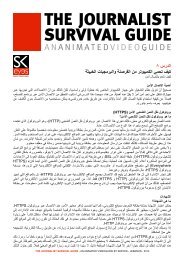JOURNALISTS' SECURITY IN WAR ZONES LESSONS FROM SYRIA
JOURNALISTS' SECURITY IN WAR ZONES LESSONS FROM SYRIA
JOURNALISTS' SECURITY IN WAR ZONES LESSONS FROM SYRIA
Create successful ePaper yourself
Turn your PDF publications into a flip-book with our unique Google optimized e-Paper software.
Journalists’ Security in War Zones: Lessons from Syriafrustration highlights the need for standardisationof terms with a view to making the workingenvironment easier and more predictable forjournalists across the board.The discussion then focused on estimating costs ofreporting from conflict zones like Syria. One staffjournalist revealed what appears to be the highlyvariable costs of reporting from a conflict zoneas between $100-200 a day for a fixer/translator,$100 for a driver, and $50 for accommodation.Freelancers, meanwhile, tended to pay fixersand drivers much less, and rely on local peopleto give them a bed or floor space for the night.Arab culture is famously generous and hospitalityis highly valued. Hence, any insistence to payfor bed and board can be insulting to one’s host(which is another reason why understanding localsensibilities is so important).But, what is highly undesirable are reports ofjournalists underpaying their support team, suchas the example cited of a fixer who complainedabout an Italian freelancer paying him just €40for a day’s work on the frontlines. Then again,journalists like Francesca Borri reported earningjust €30 more than that for a piece filed from Syriafor Italian news outlets, which explains – but doesnot excuse – underpaying fixers; this behaviourmay also contribute to tarnishing the name ofjournalists.This session continued with the consensus thatsalaries must be improved and after articulatingmany of the challenges with implementing this,participants agreed that what was required wasa collective effort from journalists – possiblythrough journalists’ unions – to standardise payrates or at least make them more transparent.Several participants, however, expressed doubtsabout the feasibility of such a process. Someinitiatives have been made in this regard already.The National Union of Journalists in the UK,for instance, has a Freelance Fee Guide (14)which provides freelancers with an idea of the salarythey should expect to receive for various types offreelance content for different media outlets. Therehave been some attempts to increase transparencyacross the board with initiatives like “Who PaysWriters” and “Who Pays Photographers” (15) ,websites that compare different pay ratesinternationally, but none have been successful.Participants identified this as a potential area inwhich organisations defending journalists’ rightscould help by plugging this information gap andcreating a table with different pay rates amongmedia outlets at an international level.Insurance“Insurance is notoriously expensive. It is probablyfair to say that many freelancers are not currentlytraipsing around the hot spots of the world withoutinsurance, because they want to or because they areignorant to the need for insurance – most simplycannot afford it”.The above statement, written by freelancers ArisRoussinos, Ayman Oghanna and Emma Bealsin a paper produced by the Frontline Club (16) ,perhaps best reflects the sentiment amongfreelancers at the conference. In general, as itstands now employers will pay insurance for staffmembers but not freelancers. Freelancers andmany staffers felt that this should change and thatemployers ought to cover insurance, or at leastcontribute significantly towards it.It was also felt that journalists could “get smarterabout insurance.” Many simply do not pay for it,and some of the ones who do neglect to read thefine print. One particularly egregious example14. See http://www.londonfreelance.org/feesguide/index.php?language=en&country=UK§ion=Welcome1815. See http://whopays.tumblr.com/ and http://whopaysphotogs.tumblr.com/16. ‘Newsgathering Safety and the Welfare of Freelancers,’ a white paper by the Frontline Club, 6 June 2013. Available athttp://www.frontlineclub.com/wp-content/uploads/2013/06/Safety-Report_WEB.pdf




